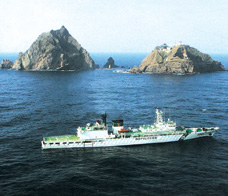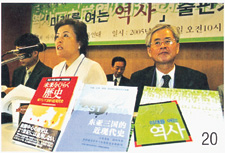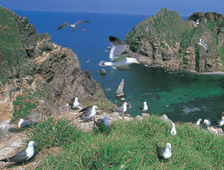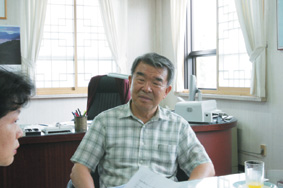Tokyo's History Distortion
Shows Nationalistic Trend
'Dokdo is an undisputed Korean territory in the historical perspective'
 Yi Mahn-yol, president of the National Institute of Korean History (NIKH), warns that Korea should pay heed of the Japan's going nationalistic under the regime of Prime Minister Yasuhiro Koizumi. As to Japan's revision of a history textbook, aimed at glossing over its past atrocity, Yi stresses that history and truth should be taught based historical materials, not unconfirmed ones and those distorted to their own tastes.
Yi Mahn-yol, president of the National Institute of Korean History (NIKH), warns that Korea should pay heed of the Japan's going nationalistic under the regime of Prime Minister Yasuhiro Koizumi. As to Japan's revision of a history textbook, aimed at glossing over its past atrocity, Yi stresses that history and truth should be taught based historical materials, not unconfirmed ones and those distorted to their own tastes.
Occasionally, Japan contends that Japan and Korea should make their way forward for the future, disregarding the past, whereas the Korean side says that to this end, it is essential to correct the distortion of the past, Yi said in a recent interview with NewsWorld. He says, ?ruth should be taught based on historical materials, but the problem under the administration of Japanese Prime Minister Yasuhiro Koizumi is that unclear things or those tailored to their tastes should have not been taught.??apanese scholars concur on Korean views during their discussions, but they cannot say such things when they return home because they are drowned by those who have a louder voice of nationalistic bent,?Yi said. Korean civic bodies need to meet their Japanese counterparts, which are sympathetic to peace of the Asia, in a bid to help them form a reasonable, conscientious majority.
Korean and Japanese scholars rounded up nearly three years of joint research on Korean history last May, but their research outcome revealed wide differences between the two countries, he said. The joint research started after Japanese Prime Minister Koizumi made the proposal during his trip to Korea in October 2001 after an issue of Japan? distortion of historical facts in their history textbooks soured Korean-Japanese diplomatic ties.
Twelve scholars each from Korea and Japan participated in the joint study and they failed to document the meetings and each side? opinions on 13 themes due to the Japanese side? refusal. Yi himself was a member of the Korean delegation working on modern and contemporary Korean history.
 A case in point is a textbook, published by Fusosha Publishing Co, a subsidiary of the Sankei Shimbun and Fuji TV with the most nationalistic trend and distortions, which are to be distributed to Japanese public schools across Japan next March. The publishing company aims to raise the distribution ratio of the latest version to 10 percent in 2006. The figure for Fusosha? 2001 version stood at 0.07 percent.
A case in point is a textbook, published by Fusosha Publishing Co, a subsidiary of the Sankei Shimbun and Fuji TV with the most nationalistic trend and distortions, which are to be distributed to Japanese public schools across Japan next March. The publishing company aims to raise the distribution ratio of the latest version to 10 percent in 2006. The figure for Fusosha? 2001 version stood at 0.07 percent.
As the Japanese side would not budge on the Korean government? strong protests, Yi suggested the solutions to the history textbook issue: through scholastic discussions and publication of books to appeal Japanese intellectuals, and through Korean civic bodies?solidarity campaign with Japanese counterparts to sway the public opinions.
Korean, Japanese and Chinese civilians?joint effort to produce a textbook for the cause of peace in Asia and solidarity for history education, which was launched in 2001, paid off. The history textbook, titled ?istory Opening the Future,?hit the bookstores last month after it was compiled and published by 54 representatives of civic organizations from Korea, China and Japan.
Among the most contentious issues on modern and contemporary history of Korea during the joint study between Korea and Japan were those about the controversial Ulsa Treaty, Japan? 36-year colonial rule of Korea and Japan? imperial invasion.
 Firstly, Korean scholars maintain all the treaties under which Korea was forced to ink unilaterally with Japan during the period between 1904-1910 should be declared null and void, citing a lack of legal procedures by forcing the Ulsa Treaty in 1905 to depriving Korea of its diplomatic rights - not sending diplomatic delegations, and without discussions and ratification, or without approval by then King Kojong. The treaty did not carry even its title, Yi said. But the Japanese claimed that all were made during legal procedures.
Firstly, Korean scholars maintain all the treaties under which Korea was forced to ink unilaterally with Japan during the period between 1904-1910 should be declared null and void, citing a lack of legal procedures by forcing the Ulsa Treaty in 1905 to depriving Korea of its diplomatic rights - not sending diplomatic delegations, and without discussions and ratification, or without approval by then King Kojong. The treaty did not carry even its title, Yi said. But the Japanese claimed that all were made during legal procedures.
During its colonial rule of Korea, he said, the Korean side said Japan exploited Koreans and disregarded their independence and creativity, whereas Japan claimed Japan contributed to the modernization of Korea.
According to Korean scholars?historical views, Japan conscripted Korean men and mobilized Korean women as sex slaves for comforting Japanese imperial military as part of its aggression strategies. The Japanese side described World War II as a campaign against European and U.S. forces to save Asia and dubbed it as the ?oly War.
 ?The widest difference between Korea and Japan was about Gaya, or Imna, an ancient kingdom that existed in the area along the Nakdong River in South Gyeongsang Province during the period between 4 C and 6C AD. Yi said Japan? claim that ancient Japan sent a governor general to govern Gaya was unfounded. Teaching students with textbooks carrying the groundless historical facts like the colonization of Gaya should be rectified, he noted.
?The widest difference between Korea and Japan was about Gaya, or Imna, an ancient kingdom that existed in the area along the Nakdong River in South Gyeongsang Province during the period between 4 C and 6C AD. Yi said Japan? claim that ancient Japan sent a governor general to govern Gaya was unfounded. Teaching students with textbooks carrying the groundless historical facts like the colonization of Gaya should be rectified, he noted.
Regarding Japan? claim over Dokdo, Yi said Dokdo, Korea? easternmost islet, is an undisputed Korean territory in the historical perspective, under international laws, and the islet is now under control of Korea.
During the Japanese-Russian war in 1904, members of the cabinet of the then Japanese government were divided over annexation of Dokdo to Japan, said Yi, adding that the foreign ministry favored, but the interior ministry opposed it. A Japanese farmer initially floated a proposal to the Navy on leasing the islet from Joseon with an eye to catching fur seals, but changed it to a petition calling for an annexation of the island.
Japan announced Dokdo was annexed to Shimane Prefecture on February 22, 1905, after depriving Korea of its rights to sign treaties, but it did not notify the decision. Koreans renewed anti-Japanese protests over Japan? claim over Dokdo, as the council of Shimane Prefecture passed a degree designating February 22 as Takeshima Day this year. Takeshima is the Japanese name of Dokdo.
Later in 1906, Shim Hung-taek, then head of Ullung Island, heard the decision on the annexation from officials from Shimane Prefecture, who arrived in the island after making an inspection tour to Dokdo, and Shim strongly protested against it, historical documents show.
Following the end of World War II, the allied powers command issued Supreme Command Allied Powers Instruction (SCAPIN) No. 667, ordering Japan to hand over Dokdo to Korea and SCAPIN No. 1033, banning Japanese ships from entering the area within a 12-nautical mile off the island.
 The United States once included an issue of Japan? possession of Dokdo in a draft of the Treaty of Peace with Japan at the consistent request of Japan, but later, the clauses was dropped from the final version after Australia protested the United States against it.
The United States once included an issue of Japan? possession of Dokdo in a draft of the Treaty of Peace with Japan at the consistent request of Japan, but later, the clauses was dropped from the final version after Australia protested the United States against it.
The Cairo Declaration and Postman Declaration, made in 1943 and 1954, respectively, stipulate that all territories, unilaterally seized by Japanese imperialists, should be returned.
The government of President Syngman Rhee announced a declaration of a 12 nautical mile line off Dokdo on January 18, 1952 before the San Francisco Treaty went into effect in April 1952.
Yi shared the view that Korea needs to publish thesauruses on Korean history in English and other languages as part of its efforts to cope with Japan? publication of a history textbook carrying distorted historical facts and China? attempt to falsify historical facts on Goguryeo. Some Korean institutions, including Korea Foundation, publicize a few historical books in English,
 but there is no thesaurus on Korean history, a unified version on Korean historical facts.
but there is no thesaurus on Korean history, a unified version on Korean historical facts.
Korea? digitizing documents with historical value preserved at national institutions and universities is still low. The Ministry of Information and Communication? project to digitize historical books is a representative example of the government? database of historical books aimed at helping the general public sharing them through the Internet. Since 2000, Such Koran historical materials as Dairies of the Royal Secretariat and Records of the Border Defense Command have been digitized. The Prime Minister? Office is working on another project on the database of the Veritable Records of the Joseon Dynasty, to be financed with the money coming from lottery funds.
NIKH also launch a five-year project on the compilation and publication of the history of overseas Koreans by collecting and organizing source materials on Korean communities abroad. Many of the Korean communities abroad have already marked more than 100 anniversary in emigration, so now is the time to gather and compile written/sound source materials on the history of foreign communities according to regional categories - China, Japan, CIS, Americas and Europe. nw
Yi Mahn-yol, president of the National Institute of Korean History (NIKH)
Japan has renewed its claim over Dokdo, the islets off the East Sea, now under the control of Korea.
(Left photo) The new history textbooks published by Korea, Japan and China.
A scenic view of Dokdo and a lighthouse with Korean national flag, taegukgi (right photo).
NIKH President Yi holding an interview with NewsWorld president-publisher Elizabeth M. Oh.
3Fl, 292-47, Shindang 6-dong, Chung-gu, Seoul, Korea 100-456
Tel : 82-2-2235-6114 / Fax : 82-2-2235-0799